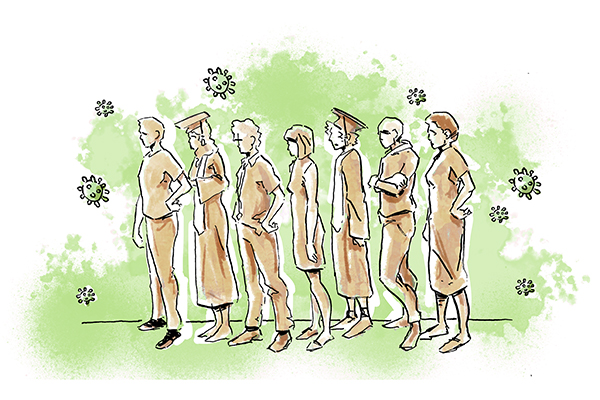When Milia Daher, a human dimensions of organization senior from Bolivia, first heard that taking online classes would jeopardize her visa status and force her to leave the country, she became filled with fear.
The COVID-19 pandemic has closed the Bolivian borders. No airlines are flying to her home. If forced to leave the U.S., she wonders, “Where am I supposed to go?”
Daher was one of 4,100 international students on F-1 visas at UT affected by guidelines U.S. Immigration and Customs Enforcement released July 6 in response to the pandemic. The guidance required students to take at least one in-person or hybrid class to stay in the U.S. and maintain their visas. After hundreds of universities filed lawsuits and signed briefs against the guidance, ICE rescinded it on July 14 in federal court.
International students will now be allowed to take all of their classes online and maintain their visas. However, in the eight days the guidance was active, international students at UT faced tremendous uncertainty regarding their visa status.
Daher said she changed her schedule to have an in-person class, which would have allowed her to stay in the U.S. under the now-rescinded guidance. However, while other schools challenged the guidance in court, she said UT’s response was disappointing.
“The ICE decision was cruel,” Daher said. “They put us in this position where if you want to stay, you have to risk your health and other people too. It was really sad to me to see that (the University) just complied (with the new rules). … It doesn’t make me feel safe.”
On July 8, Harvard University and the Massachusetts Institute of Technology filed a lawsuit in the U.S. District Court in Boston challenging the guidelines, according to the Harvard Gazette. More than 200 schools across the country signed amicus briefs in support of Harvard and MIT, or filed their own lawsuits.
As a public university in Texas, UT must obtain permission from the Office of the Attorney General of Texas to pursue litigation led by outside counsel, such as briefs filed by other universities, according to Texas Government Code Section 402.0212.
University spokesperson J.B. Bird said the University did not plan to pursue litigation against ICE.
Planet Longhorn, the University’s largest international student organization, started a petition July 8 asking the University to prioritize international students for in-person and hybrid courses in light of the rules. The petition gained more than 18,000 signatures.
Planet Longhorn president Edson Santos, an economics and civil engineering junior from Angola, said he struggled to find in-person classes that would allow him to stay in the U.S. under the rescinded guidance. He said the University needed to “step up” and help its international students.
UT Student Government, UT Senate of College Councils, the Graduate Student Assembly and Planet Longhorn released a joint statement July 13 asking the University to help international students by providing immigration legal support, extending financial aid, reducing tuition and dissuading the UT Police Department and Austin Police Department from working with ICE.
“International students are a part of our Longhorn family,” the statement said. “Students should not be forced to risk their health and safety in order to keep their visas and make continual progress on their degree plan.”
In response to pushback over UT’s response prior to the guidance being rescinded, Bird said the University was taking other steps to support its 5,600 international students.
“We are reaching out to all of our students with F-1 visas to help them navigate this new landscape, working with colleges and schools to make sure they have sufficient hybrid course offerings and making sure our international students have the opportunity to take the kinds of courses they need to remain in the country,” Bird said in an email July 9.
Palash Taneja, a computer science sophomore from India, created a collaborative spreadsheet to find classes that would allow him to stay in the U.S. The document lists more than 600 in-person and hybrid classes at UT this fall.
“I was really happy to see how much work people really put into that,” Taneja said. “I started it, but I think I only contributed about 5% of the classes in the spreadsheet.”
Norman Wang, an economics junior from China, said figuring out how to deal with the ICE guidance was nerve-wracking. He said he flew back to China on July 18 and will take online classes for the semester because his health is his greatest priority. He called the since-rescinded rules politically motivated and unfair.
“In order to pressure (schools) to reopen in fall, the Trump administration used (international students) as a pawn,” Wang said.
Sociology doctorate student Chen Liang is currently in her home country of Taiwan. Liang said the new ICE guidelines would have made her go back to Austin, which concerned her because cases are spiking.
“I don’t want to return to the U.S.,” Liang said. “I feel I was lucky enough to escape the severe situation in Texas. … Nobody knows what will happen in the next two months.”
Liang said she worries about the possibility of the U.S. government issuing more restrictions preventing her from entering the country.
“I do not know what will happen next,” Liang said. “(The ICE guidance) came out of (nowhere).”





















